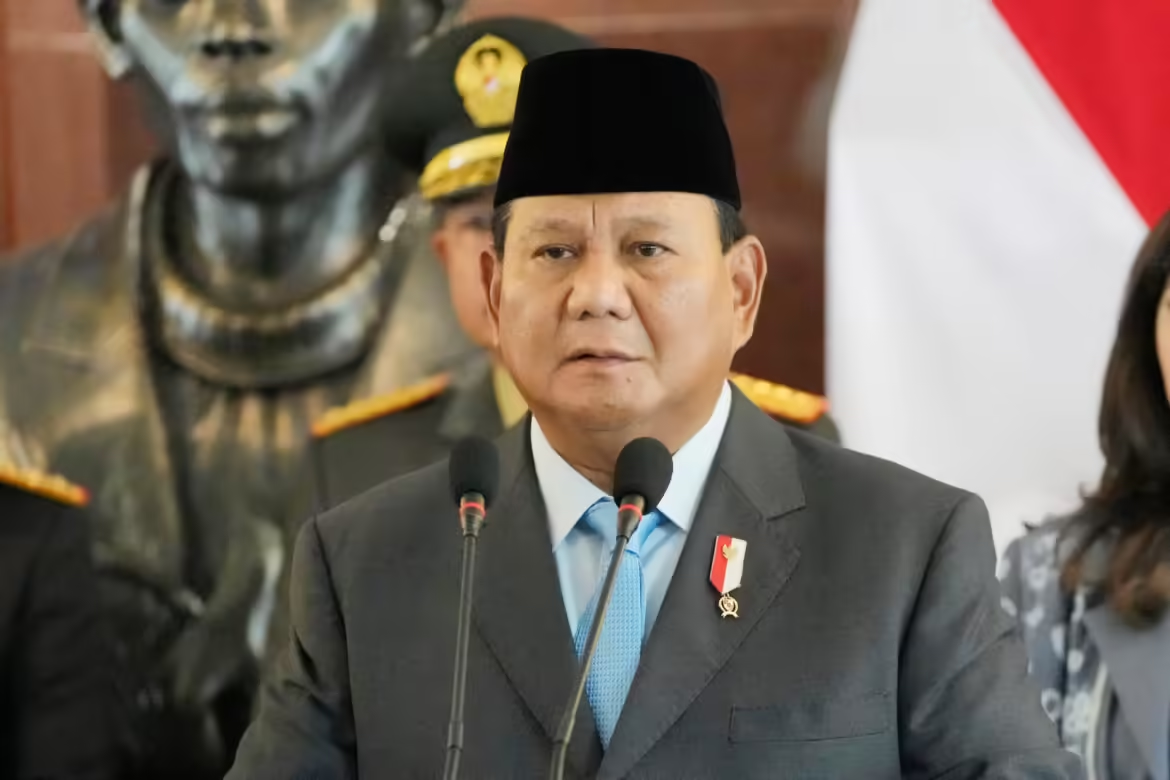Indonesia welcomes its new president, Prabowo Subianto, who has appointed the largest cabinet of ministers in the country’s history. The 73-year-old former military general, inaugurated on Sunday as Indonesia’s eighth president, has formed a cabinet that includes 48 ministers and 58 vice-ministers, marking a significant increase from the previous administration under former President Joko Widodo, also known as Jokowi.
Prabowo, who had previously faced allegations of human rights abuses and unsuccessfully ran for the presidency twice, secured over 58% of the vote in the February elections. His victory was achieved against two political rivals and came with the support of influential figures, including his predecessor Jokowi, whose endorsement was key to Prabowo’s success. The new president was sworn in alongside his running mate, Gibran Rakabuming Raka, Jokowi’s eldest son.
Historic Cabinet Size
Indonesia welcomes its new president with the largest cabinet of ministers ever, a stark contrast to the previous administration’s 34 ministers and 30 vice-ministers. Prabowo’s cabinet is seen as a mix of continuity and political reward. Seventeen ministers from Jokowi’s administration have been reappointed, including Finance Minister Sri Mulyani Indrawati and Chief Economic Minister Airlangga Hartarto. This has led many observers to believe that Prabowo’s appointments are a way of repaying political favors and support from Jokowi and his allies.
Lina Miftahul Jannah, a public policy scholar, commented on the cabinet’s size, warning that a “bloated cabinet” could complicate bureaucratic processes and lengthen the time it takes to implement policies. “Re-organizing the different ministries would also be resource-intensive, both in terms of money and energy,” she added, raising concerns about the efficiency of governance under the new administration.
Political Continuity
The reappointment of key figures from Jokowi’s administration signals that Indonesia’s new president aims to maintain continuity in governance. Prabowo’s campaign promised to continue Jokowi’s focus on development and infrastructure projects, policies that have driven economic growth in Southeast Asia’s largest economy. Political scientist Burhanuddin Muhtadi noted that the inclusion of Jokowi’s former ministers indicates Prabowo is keen to avoid risks and ensure stability in his administration.
Indonesia, as one of the world’s largest democracies and the biggest economy in Southeast Asia, stands at a critical juncture. Prabowo’s focus on continuity suggests that he does not intend to make radical shifts in the country’s economic or political direction, instead building on the foundations laid by his predecessor.
Vision for the Future
During his inauguration speech, Prabowo vowed to tackle major challenges such as corruption and poverty, pledging to be a president for all Indonesians. He emphasized the need to uplift the country’s poorest citizens and ensure that freedom is felt by all. “We must always realize that a free nation is where the people are free,” he declared, emphasizing his commitment to alleviating poverty, hunger, and oppression.
On the foreign policy front, Prabowo reaffirmed Indonesia’s long-standing policy of non-alignment, ensuring that the country remains neutral and independent of major global power blocs. “We will stand against all colonialism and defend the interests of oppressed people worldwide,” he stated, reinforcing Indonesia’s commitment to sovereignty and global justice.
Challenges and Expectations
While Indonesia welcomes its new president with the largest cabinet of ministers in its history, many challenges lie ahead. Prabowo’s government will need to address economic disparities, maintain political stability, and navigate the complexities of international relations, particularly in a region marked by rising geopolitical tensions. His cabinet, despite its large size, is expected to face intense scrutiny as it works to meet the high expectations of both the Indonesian public and the international community.
The cabinet will begin its term with a three-day retreat at a military academy in Central Java, where ministers and their deputies will sleep in tents. The retreat aims to foster unity within the new government and help cabinet members align with Prabowo’s vision for the country. Abdul Kadir Karding, the new migrant protection minister, described the retreat as essential for bonding the cabinet and ensuring a shared understanding of the president’s goals.
Global Stage
Indonesia’s new president is set to make his first international appearances at the Asia-Pacific Economic Cooperation (APEC) summit next month and the G20 summit immediately afterward. These global forums will give Prabowo the opportunity to outline his administration’s foreign policy agenda and further solidify Indonesia’s role in global affairs.
As Indonesia welcomes its new president with the largest cabinet of ministers in history, the nation prepares for a period of continuity and potential transformation. The new administration, led by Prabowo, has ambitious goals, from strengthening the economy to fighting corruption, all while maintaining Indonesia’s position as a neutral player on the global stage. The coming months will reveal how effectively this historic cabinet can govern and fulfill the promises made to the Indonesian people.
Stay connected to know more on arcnews.online for global news like Indonesia Welcomes New President with the Largest Cabinet of Ministers in History. For videos updates visit our YouTube. Do subscribe to Arcnews to get latest updates directly in your mail box.
Have A Great Day.


